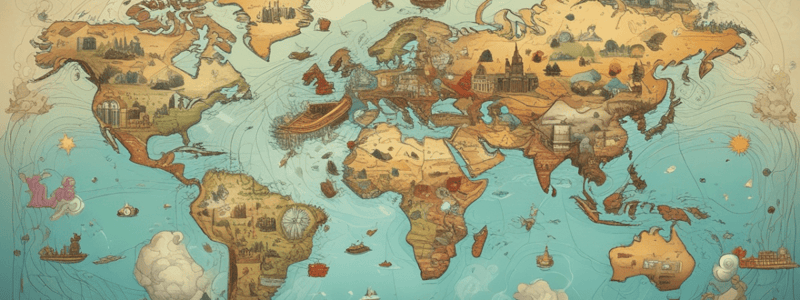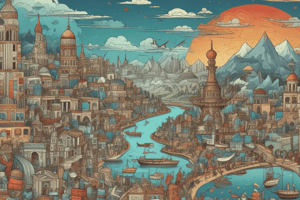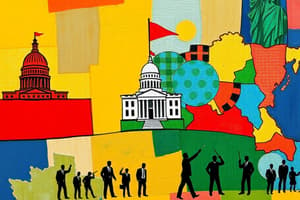Podcast
Questions and Answers
What is the primary characteristic of an absolute monarchy?
What is the primary characteristic of an absolute monarchy?
- A system where the king or queen has limited powers
- A system where the people have the most power
- A system where power is distributed among multiple people
- A type of government where all power lies in one person (correct)
What is the term for the increase in population of people living in towns and cities?
What is the term for the increase in population of people living in towns and cities?
- Agriculture
- Urbanization (correct)
- Mechanization
- Industrialization
What was the primary purpose of the Committee of Public Safety during the Reign of Terror?
What was the primary purpose of the Committee of Public Safety during the Reign of Terror?
- To protect the rights of citizens
- To maintain public safety and order
- To punish enemies of the revolution (correct)
- To establish a new form of government
What is the term for the process of beginning to use machines and technology to do work?
What is the term for the process of beginning to use machines and technology to do work?
What is the term for the system where the government makes all the decisions for the people?
What is the term for the system where the government makes all the decisions for the people?
What is the primary purpose of the Steam Engine?
What is the primary purpose of the Steam Engine?
What is the term for the intent to destroy a national or religious group?
What is the term for the intent to destroy a national or religious group?
What is the primary characteristic of a bourgeoisie?
What is the primary characteristic of a bourgeoisie?
What is the term for the rate of increase in prices over a given period of time?
What is the term for the rate of increase in prices over a given period of time?
What is the primary purpose of the Tennis Court Oath?
What is the primary purpose of the Tennis Court Oath?
What is the main goal of the Indian Act?
What is the main goal of the Indian Act?
What was the 1969 White Paper proposing to do?
What was the 1969 White Paper proposing to do?
Why were residential schools established?
Why were residential schools established?
What was the consequence of prohibiting Indigenous children from speaking their own language at residential schools?
What was the consequence of prohibiting Indigenous children from speaking their own language at residential schools?
What was the Indian Act's approach to dealing with Aboriginal people?
What was the Indian Act's approach to dealing with Aboriginal people?
What was the outcome of the forced assimilation policies of the Indian Act and residential schools?
What was the outcome of the forced assimilation policies of the Indian Act and residential schools?
How did the Indian Act and residential schools affect Indigenous families?
How did the Indian Act and residential schools affect Indigenous families?
What was the nature of the Indian Act?
What was the nature of the Indian Act?
What was the goal of controlling education through residential schools?
What was the goal of controlling education through residential schools?
What was the impact of the Indian Act and residential schools on Indigenous cultural traditions and activities?
What was the impact of the Indian Act and residential schools on Indigenous cultural traditions and activities?
What was the primary goal of the Indian Act and residential schools?
What was the primary goal of the Indian Act and residential schools?
How did the Indian Act treat Aboriginal people?
How did the Indian Act treat Aboriginal people?
What was the consequence of prohibiting Indigenous children from speaking their own language at residential schools?
What was the consequence of prohibiting Indigenous children from speaking their own language at residential schools?
What was the outcome of the forced assimilation policies of the Indian Act and residential schools?
What was the outcome of the forced assimilation policies of the Indian Act and residential schools?
What was the nature of the Indian Act?
What was the nature of the Indian Act?
What type of government is characterized by one person having all the power?
What type of government is characterized by one person having all the power?
What was the goal of controlling education through residential schools?
What was the goal of controlling education through residential schools?
What is the term for the loyalty and attachment to a country?
What is the term for the loyalty and attachment to a country?
What was the Tennis Court Oath?
What was the Tennis Court Oath?
What is the term for the increase in prices over a period of time?
What is the term for the increase in prices over a period of time?
What is the term for the process of people moving from rural areas to cities?
What is the term for the process of people moving from rural areas to cities?
What is the term for a system where the government makes all the decisions?
What is the term for a system where the government makes all the decisions?
What is the term for the control of one power over another?
What is the term for the control of one power over another?
What is the term for the intent to destroy a national or religious group?
What is the term for the intent to destroy a national or religious group?
What type of government is characterized by a single person having all the power?
What type of government is characterized by a single person having all the power?
What is the term for the process of people moving from rural areas to cities?
What is the term for the process of people moving from rural areas to cities?
What is the primary goal of socialism as a way to organize a society?
What is the primary goal of socialism as a way to organize a society?
What was the significance of the Tennis Court Oath during the French Revolution?
What was the significance of the Tennis Court Oath during the French Revolution?
How did the Indian Act and residential schools impact the cultural traditions and activities of Indigenous peoples?
How did the Indian Act and residential schools impact the cultural traditions and activities of Indigenous peoples?
What is the term for the rate of increase in prices over a given period of time?
What is the term for the rate of increase in prices over a given period of time?
What was the goal of the Canadian government in establishing residential schools?
What was the goal of the Canadian government in establishing residential schools?
How did the Indian Act treat Aboriginal people?
How did the Indian Act treat Aboriginal people?
What was the main impact of the first industrial revolution in Britain?
What was the main impact of the first industrial revolution in Britain?
What is the term for the control of one power over another?
What is the term for the control of one power over another?
What was the outcome of the forced assimilation policies of the Indian Act and residential schools?
What was the outcome of the forced assimilation policies of the Indian Act and residential schools?
What is the term for the intent to destroy a national or religious group?
What is the term for the intent to destroy a national or religious group?
What was the purpose of controlling education through residential schools?
What was the purpose of controlling education through residential schools?
What was the nature of the Indian Act?
What was the nature of the Indian Act?
Flashcards are hidden until you start studying
Study Notes
Systems of Government and Society
- Absolute Monarchy: a government where all power lies in one person, often the king or queen.
- Feudalism: a medieval model of government before the birth of the modern nation-state.
Important Events and Groups
- Tennis Court Oath: an oath taken on June 20, 1789, at the Palace of Versailles, marking the beginning of the French Revolution.
- National Assembly: a group that played a key role in the French Revolution.
- Declaration of the Rights of Man and Citizen: a document adopted in 1789, stating the fundamental principles of the French Revolution.
- Reign of Terror: a period of violence during the French Revolution, marked by the establishment of the Committee of Public Safety.
Economic Systems and Concepts
- Capitalism: an economic system.
- Socialism: a way to organize a society.
- Mechanization: the process of beginning to use machines and technology to do work.
- Urbanization: the increase in population of people living in towns and cities.
- Agriculture: the practice of growing crops or raising animals.
- Inflation: the rate of increase in prices over a given period of time.
- Deficit: a deficiency in amount or price.
Industrial Revolution
- First Industrial Revolution in Britain: started in the late 18th and 19th centuries, marked by mechanization, including the invention of the Spinning Jenny.
- Spinning Jenny: a machine used for spinning wool or cotton.
- Steam Engine: a machine using steam power to perform mechanical work through heat.
- Changes to Transportation: the use of steam engines led to the development of locomotives and steam boats, revolutionizing transportation.
Social and Political Concepts
- Assimilate: the process of becoming similar to others.
- Paternalism: making all the decisions for the people you govern.
- Colonialism: control by one power over another.
- Cultural Genocide: the intent to destroy a national or religious group.
- Reserves: held back for future use.
The Indian Act
- Classifications: Non-Status Indians and Status Indians.
- Goals: control and assimilation.
- The Indian Act is paternalistic, treating Aboriginal people like children that need parents to look after them.
- The Indian Act is not a treaty and was imposed on Aboriginals by the government.
Residential Schools
- Established by the Canadian government to assimilate Indigenous peoples into a settler society.
- Trauma and Abuse: widespread physical, emotional, and sexual abuse of Indigenous children.
- Control over education, prohibiting Indigenous languages and cultural practices.
- Children were taken away from their homes, unable to communicate with their families.
Systems of Government and Society
- Absolute Monarchy: a government where all power lies in one person, often the king or queen.
- Feudalism: a medieval model of government before the birth of the modern nation-state.
Important Events and Groups
- Tennis Court Oath: an oath taken on June 20, 1789, at the Palace of Versailles, marking the beginning of the French Revolution.
- National Assembly: a group that played a key role in the French Revolution.
- Declaration of the Rights of Man and Citizen: a document adopted in 1789, stating the fundamental principles of the French Revolution.
- Reign of Terror: a period of violence during the French Revolution, marked by the establishment of the Committee of Public Safety.
Economic Systems and Concepts
- Capitalism: an economic system.
- Socialism: a way to organize a society.
- Mechanization: the process of beginning to use machines and technology to do work.
- Urbanization: the increase in population of people living in towns and cities.
- Agriculture: the practice of growing crops or raising animals.
- Inflation: the rate of increase in prices over a given period of time.
- Deficit: a deficiency in amount or price.
Industrial Revolution
- First Industrial Revolution in Britain: started in the late 18th and 19th centuries, marked by mechanization, including the invention of the Spinning Jenny.
- Spinning Jenny: a machine used for spinning wool or cotton.
- Steam Engine: a machine using steam power to perform mechanical work through heat.
- Changes to Transportation: the use of steam engines led to the development of locomotives and steam boats, revolutionizing transportation.
Social and Political Concepts
- Assimilate: the process of becoming similar to others.
- Paternalism: making all the decisions for the people you govern.
- Colonialism: control by one power over another.
- Cultural Genocide: the intent to destroy a national or religious group.
- Reserves: held back for future use.
The Indian Act
- Classifications: Non-Status Indians and Status Indians.
- Goals: control and assimilation.
- The Indian Act is paternalistic, treating Aboriginal people like children that need parents to look after them.
- The Indian Act is not a treaty and was imposed on Aboriginals by the government.
Residential Schools
- Established by the Canadian government to assimilate Indigenous peoples into a settler society.
- Trauma and Abuse: widespread physical, emotional, and sexual abuse of Indigenous children.
- Control over education, prohibiting Indigenous languages and cultural practices.
- Children were taken away from their homes, unable to communicate with their families.
Systems of Government and Society
- Absolute Monarchy: a government where all power lies in one person, often the king or queen.
- Feudalism: a medieval model of government before the birth of the modern nation-state.
Important Events and Groups
- Tennis Court Oath: an oath taken on June 20, 1789, at the Palace of Versailles, marking the beginning of the French Revolution.
- National Assembly: a group that played a key role in the French Revolution.
- Declaration of the Rights of Man and Citizen: a document adopted in 1789, stating the fundamental principles of the French Revolution.
- Reign of Terror: a period of violence during the French Revolution, marked by the establishment of the Committee of Public Safety.
Economic Systems and Concepts
- Capitalism: an economic system.
- Socialism: a way to organize a society.
- Mechanization: the process of beginning to use machines and technology to do work.
- Urbanization: the increase in population of people living in towns and cities.
- Agriculture: the practice of growing crops or raising animals.
- Inflation: the rate of increase in prices over a given period of time.
- Deficit: a deficiency in amount or price.
Industrial Revolution
- First Industrial Revolution in Britain: started in the late 18th and 19th centuries, marked by mechanization, including the invention of the Spinning Jenny.
- Spinning Jenny: a machine used for spinning wool or cotton.
- Steam Engine: a machine using steam power to perform mechanical work through heat.
- Changes to Transportation: the use of steam engines led to the development of locomotives and steam boats, revolutionizing transportation.
Social and Political Concepts
- Assimilate: the process of becoming similar to others.
- Paternalism: making all the decisions for the people you govern.
- Colonialism: control by one power over another.
- Cultural Genocide: the intent to destroy a national or religious group.
- Reserves: held back for future use.
The Indian Act
- Classifications: Non-Status Indians and Status Indians.
- Goals: control and assimilation.
- The Indian Act is paternalistic, treating Aboriginal people like children that need parents to look after them.
- The Indian Act is not a treaty and was imposed on Aboriginals by the government.
Residential Schools
- Established by the Canadian government to assimilate Indigenous peoples into a settler society.
- Trauma and Abuse: widespread physical, emotional, and sexual abuse of Indigenous children.
- Control over education, prohibiting Indigenous languages and cultural practices.
- Children were taken away from their homes, unable to communicate with their families.
Studying That Suits You
Use AI to generate personalized quizzes and flashcards to suit your learning preferences.





